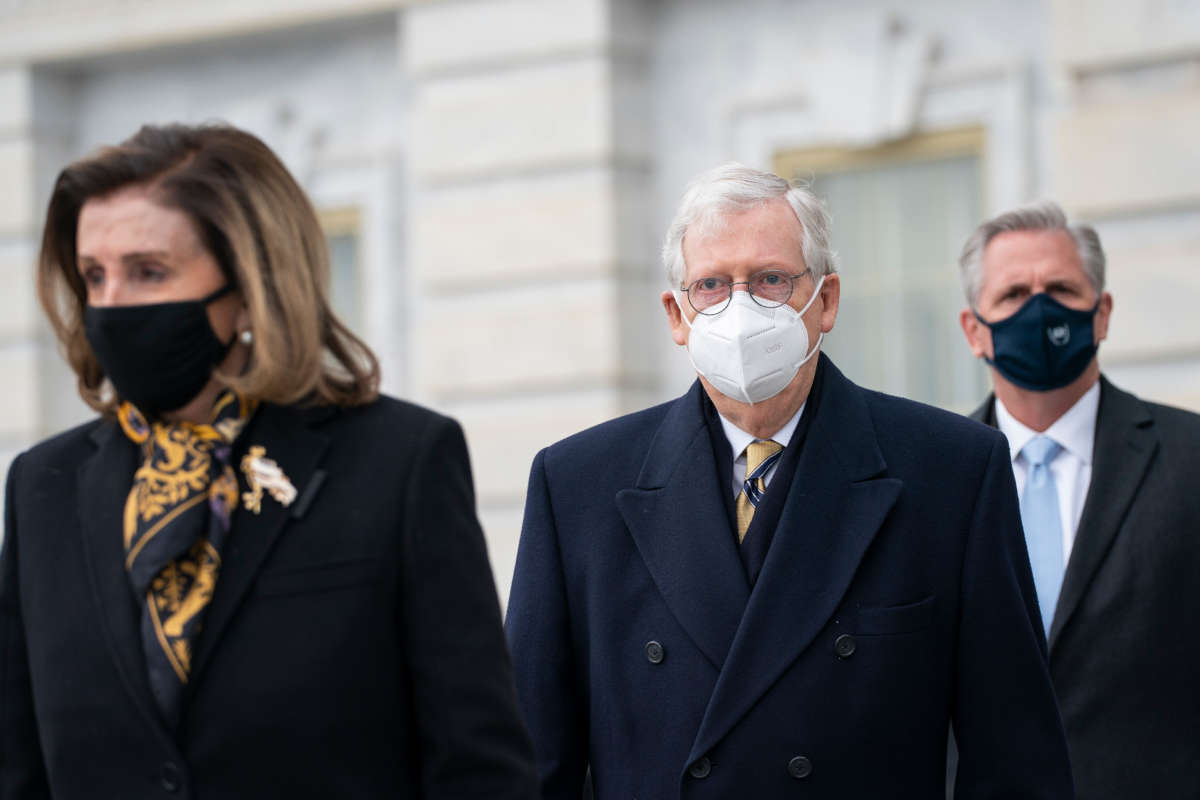Last week, House Speaker Nancy Pelosi (D-California) began forming a commission that would investigate the Capitol breach fueled by former President Donald Trump on January 6. The commission’s formation is at a standstill, however, as Republicans are insisting that they get equal representation on the committee.
The commission will be tasked with investigating the events of the attempted coup when Trump supporters tried to violently take over the Capitol to get the results of the election overturned. “There is really strong support in the country for us to seek the truth, find the truth, but also understand how we have to protect the American people,” said Pelosi about the panel last week.
Though the commission hasn’t yet been formally formed, Pelosi has reportedly proposed that Democrats will choose seven of its seats while Republicans will choose four.
Republicans have taken issue with that. Senate Minority Leader Mitch McConnell (R-Kentucky) and House Minority Leader Kevin McCarthy (R-California) both said on Wednesday that the commission should be a 50/50 split between Republicans and Democrats and that all members of the commission should have subpoena power, as opposed to just the committee chair, who is set to be appointed by President Joe Biden.
The Republicans’ argument is that bipartisanship helped the 9/11 Commission, after which this panel is based, achieve success.
However, some have disputed that this should be the case for the January 6 coup attempt, which originated from rabid support for Trump, and whose cause to overturn the results of the presidential election to keep Trump in office had major support among the Republican Party.
One-hundred-forty-seven Republicans voted to overturn the election results when Congress reconvened after the coup attempt that took multiple lives. The results of the impeachment votes in the House and the Senate show, too, that Republicans still feel a sense of fealty to Trump and his base.
Even McConnell voted against Trump’s conviction and is objecting to Pelosi’s terms for the commission, even though he has maintained that Trump is responsible for the January 6 attack — though his objections may be less about Trump and more about the commission making the GOP look bad.
“I don’t think that you could make this a bipartisan committee,” said political analyst and journalism professor Jason Johnson on MSNBC. “You can’t put together [a bipartisan] investigative committee on an issue where, literally, your co-workers may have also been conspirators.”
“We all wish that you could have five Republicans, five Democrats and they could get together and work it out,” Johnson said, but, “You have a significant chunk of the Republican Party that is pretending that not just the insurrection either didn’t happen, but that, maybe, their colleagues and ideologies they push for and the candidate they supported didn’t have anything to do with it.”
Republicans also reportedly want the commission’s scope to be broadened to look at other “mob-like attacks” in the country, a Democratic aide told Politico, implying that Republicans may try to draw false equivalences between the Black Lives Matter movement and the attempted coup. “Minority Leader McConnell made clear that Republicans do not want a commission and that if one is created, they aim to try to make it about antifa,” the aide said.
This proposal, writes Rafi Schwartz in Mic, is simply Republicans “holding [the commission] hostage in order to water it down into an overly broad example of false equivalency.”
Pelosi has said that she is less concerned about the political makeup of the committee, and she would rather focus on determining its scope. Under the current proposal for the commission, the group would issue a report by the end of the year.
Join us in defending the truth before it’s too late
The future of independent journalism is uncertain, and the consequences of losing it are too grave to ignore. To ensure Truthout remains safe, strong, and free, we need to raise $50,000 in the next 9 days. Every dollar raised goes directly toward the costs of producing news you can trust.
Please give what you can — because by supporting us with a tax-deductible donation, you’re not just preserving a source of news, you’re helping to safeguard what’s left of our democracy.
